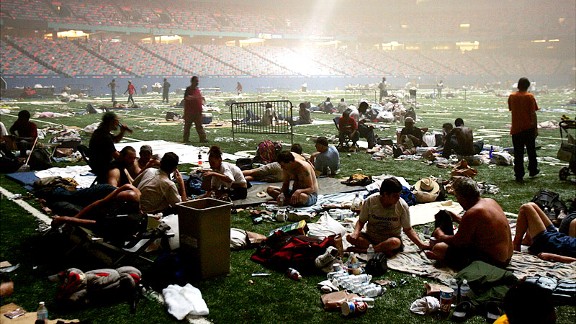“it came to pass, that Cain brought of the fruit of the ground an offering unto the LORD. And Abel, he also brought of the firstlings of his flock and of the fat thereof. And the LORD had respect unto Abel and to his offering: But unto Cain and to his offering he had not respect.
And Cain was very wroth, and his countenance fell. And the LORD said unto Cain, Why art thou wroth? and why is thy countenance fallen? If thou doest well, shalt thou not be accepted? and if thou doest not well, sin lieth at the door. And unto thee shall be his desire, and thou shalt rule over him.” (Genesis 4:3-7)
That last sentence is a bit confusing unless we recognize that this most essential pronouncement is spoken in poetry. As is so much of the Bible, for good reason.
When a memory has a poem attached to it, it strengthens both the memory and the remembrance of the poem. My son Greg used to call it “rememborizing” when he was three or four. You both remember and have committed to memory.
You now have a framework to which to attach new memories, new knowledge, new poems, and new information.
The patterns which distinguish Hebrew poetry are found at several levels…
Sound. The two ways in which sound is brought into play are the repetition of consonants (related to alliteration in English poetry) and the repetition of vowel sounds (related to rhyme…).
Meter. The Hebrew verse unit is very short, often composed of only two or three words. When counting accents, each of these words receives an accent.
Word. A frequent device in Hebrew poetry is the use of the word pair, two words that are frequently linked and usually appear in consecutive lines.
Imagery. Hebrew poetry is rich in imagery…
A basic constituent of Hebrew poetry is the device of parallelism…
Synonymous parallelism occurs when the major terms mean basically the same thing…
When the major terms are opposites, the result is antithetic parallelism…
the essential function of parallelism was not to indicate equivalency (A = B), but rather complementarity, frequently intensification or expansion (“A is so, and what’s more B”)…
A poetic technique related to parallelism is called chiasm. Chiasm is the construction of a line so that the balancing elements in the first colon occur in reverse order in the second colon (ABBA).
Without knowing Hebrew we can’t pick up any sound or meter constructs, but fortunately the Hebrew poetic style translates well into any language through imagery and parallelism. When we recognize the antithetic parallelism with its intensification of the second concept, and the chiasm making sense of the last line, the passage becomes clear as day. Most of all, recognizing the poetic form turns this passage into a flashing red light, an urgent warning that this doctrine needs to be memorized and integrated into future recognition of Stranger Danger! for all humanity.
“And the LORD said unto Cain [and all humanity]…
- A1 If thou doest well, shalt thou not be accepted [by the LORD God into his life]?
- B1: and if thou doest not well, sin [the opposite of life – decay, degeneration, death] lieth at the door [hovers at every possible entrance into the body to the soul].
- B2: And unto thee shall be his desire [he shall control you]
- A2: and thou shalt rule over him [have dominion].” (Genesis 4:5-7)
As we know from history and personal experience, much of humanity ignores the warnings of impending doom.
We destroy relationships when we knowingly do things that hurt or alienate the ones we are supposed to be in unity with. Ironically, we often harm ourselves most of all by losing resources vital to our own well-being when we selfishly refuse to submit to one another, i.e. give as well as take, in relationships.
“And Cain talked with Abel his brother: and it came to pass, when they were in the field, that Cain rose up against Abel his brother, and slew him.” (Genesis 4:8)
The name “Cain” means “Spear”.
Now there’s a clue.
Ancient names were essentially a memorial to that individual’s notable characteristics or exploits. “Spear” would not have been written on his earthly birth certificate but in God’s book in heaven as his unique identifier after he kills righteous Abel.
If we accept his name as his memorial then Cain did not commit second degree murder grabbing a handy stone in the heat of anger. The report that he “rose up against Abel his brother and slew him” (Genesis 4:8) certainly brings to mind an image of stalking one’s prey using a flint tipped projectile he cleverly prepared in advance.
“what they know naturally, as brute beasts, in those things they corrupt themselves. Woe unto them! for they have gone in the way of Cain…murmurers, complainers, walking after their own lusts.” (Jude 1:11-16)
The word sin has become unpopular in current society, especially when applied to specific behaviors that are no longer illegal. But we acknowledge that there are behaviors that an individual engages in, or fails to undertake, at the unjust expense of others.
Self-serving behavior is so evidently a part of everyone’s naturally occurring behavior, even from birth, that is is a rational deduction rather than an act of faith to say that humans have a “sin nature”.
- There is none right-eous [always doing the right thing], no, not one:
- There is none that understandeth [always rational, we are often controlled by our emotions or physical desires despite awareness of negative consequences of actions],
- there is none that seeketh after God [wanting to be morally correct]…
- there is none that doeth good, no, not one…
- with their tongues they have used deceit…
- There is no fear of God before their eyes…
- For all have sinned. (Letter to the Romans 3:10-18, 23)
We lock our homes and cars for a reason. Robbery and murder weren’t just in the American Wild West. The military is called in after disasters to minimize the inevitable breakdown of social order during which the weak suffer at the hands of the strong.

No matter how moral and socially conscientious we believe ourselves to be, we all have our breaking point, a thin line that triggers a response when it gets crossed. This may be as amoral as rationalizing driving faster than the posted speed limit because no-one else is on the expressway to as immoral as stealing and killing under certain circumstances.

[During Hurricane Katrina in New Orleans] Inside the Superdome, things were descending further into hell…People had broken up into factions by race, separating into small groups throughout the building that the National Guard struggled to control. A few of these groups wandered the concourse, stealing food and attacking anyone who stood up to them.
The tiny jail cell down in the bowels of the Dome, which they kept for game-day security, was filling up. A man had been caught sexually assaulting a young girl. Reports of other rapes were widespread…
Supplies were running low, and as the National Guard began to ration things like water and diapers the crowd grew incensed and accused them of hoarding goods for their own use…
That night a National Guardsman got jumped as he walked through a dark, flooded locker room. His assailant hit him with a metal rod taken from a cot…
In response, guardsmen put up barbed wire at various areas around the building, protecting themselves from the general population. [Emphasis added.]
“And the LORD said unto Cain, Where is Abel thy brother? And he said, I know not: Am I my brother’s keeper? And he said, What hast thou done? the voice of thy brother’s blood crieth unto me from the ground. And now art thou cursed from the earth, which hath opened her mouth to receive thy brother’s blood from thy hand; When thou tillest the ground, it shall not henceforth yield unto thee her strength; a fugitive and a vagabond shalt thou be in the earth.” (Genesis 4:8-12)
God cursed the ground so Cain could not farm. We can see how the punishment exquisitely fit the crime in that instance. But can we see how this is also chastening from a loving Father? Cain was no longer able to offer God a vegan sacrifice, he had no other option but to offer a blood sacrifice. God was guiding him into the way of salvation.
“For whom the Lord loveth he chasteneth, and scourgeth every son whom he receiveth.” (Hebrews 12:6)
“My son, if thou wilt receive my words, and hide my commandments with thee; So that thou incline thine ear unto wisdom, and apply thine heart to understanding…Then shalt thou understand the fear of the Lord, and find the knowledge of God. For the Lord giveth wisdom: out of his mouth cometh knowledge and understanding…Then shalt thou understand righteousness, and judgment, and equity; yea, every good path…That thou mayest walk in the way of good men, and keep the paths of the righteous.” (Proverbs 2:1-20)
Forgiveness, redemption and reconciliation with God and mankind were as available to Cain as they were to his parents and all the rest of mankind. Most humans don’t farm, we work in harmony with our community and trade whatever we produce in goods and services to meet each other’s needs. Cain just chose not to seek forgiveness and reconciliation.
The statement that Cain would be a fugitive and a vagabond is better understood as an astute observation of the consequences of Cain’s decision not to seek forgiveness and restoration of relationship. It is important to recognize the difference.
- Punishment is imposed by a social law and is generally not under our control.
- Consequence is the inevitable effect of our own actions, and any future consequences are under our control. We simply have to repent – rethink – what we are doing and change the behaviors that cause us harm.
Cain didn’t repent and take responsibility for his own actions. Don’t take his word for it that he was being punished. Like every recalcitrant drug abuser I’ve dealt with, he whines that the inevitable results of his behavior – homelessness, estrangement from family, ruined social relationships, unemployment, poverty – is “unfair punishment” imposed by an overly strict law, and wants the person(s) trying to help him reform to repent / rethink their plans and change their behavior in order to lighten his burden of responsibility to reform. Cain chose to become a fugitive from justice in the first feud.
“And Cain said unto the LORD, My punishment is greater than I can bear. Behold, thou hast driven me out this day from the face of the earth; and from thy face shall I be hid; and I shall be a fugitive and a vagabond in the earth; and it shall come to pass, that every one that findeth me shall slay me. And the LORD said unto him, Therefore whosoever slayeth Cain, vengeance shall be taken on him sevenfold. And the LORD set a mark upon Cain, lest any finding him should kill him.” (Genesis 4:13-15)
The mark of Cain has been cause for speculation, such as being the origin of dark skin. The Bible gives us no reason to believe that this mark was inherited by Cain’s offspring, and in any case they all died in the flood. All we are actually told about the mark of Cain is that it protected him. God also put a mark of protection on men many years later.
“And the LORD said unto him, Go through the midst of the city, through the midst of Jerusalem, and set a mark upon the foreheads of the men that sigh and that cry for all the abominations that be done in the midst thereof. And to the others he said in mine hearing, Go ye after him through the city, and smite…and begin at my sanctuary.” (Ezekiel 9:3-6)
It should come as no surprise that Anti-christ mimics this strategy, promising protection to those who take his mark.
“And he had power to…cause that as many as would not worship the image of the beast should be killed. And he causeth all, both small and great, rich and poor, free and bond, to receive a mark in their right hand, or in their foreheads: And that no man might buy or sell, save he that had the mark, or the name of the beast, or the number of his name.” (Revelation 13:15-18)
With God’s mark, Cain was, even if unwillingly, a witness of God’s mercy “in the midst of a perverse and crooked nation.” (Philippians 2:15)
“And Lamech said…I have slain a man…If Cain shall be avenged sevenfold, truly Lamech seventy and sevenfold.” (Genesis 4:23-24)
It doesn’t sound to me that Lamech was humbly calling on the Most High God. God is not a mercenary soldier at our beck and call…Lamech’s inflated claim sounds like what psychiatry describes as “hyper”-religiosity – boasting of self-serving power based on imagination. He was very likely calling on the anti-christ worshiped in his day.
Is it inconceivable that God blessed Cain in spite of his wickedness? The fact is, all of us are as guilty as Cain and Esau and need God’s blessing.
“Therefore thou art inexcusable, O man, whosoever thou art that judgest: for wherein thou judgest another, thou condemnest thyself; for thou that judgest doest the same things. ” (Romans 2:1)
The fact is, the selfishness, greed and utter lack of compassion results in infighting and self destruction of the wicked.
“O Lucifer, son of the morning! how art thou cut down to the ground, which didst weaken the nations!…Prepare slaughter for his children for the iniquity of their fathers; that they do not rise, nor possess the land, nor fill the face of the world with cities.” (Isaiah 14)
“And Cain [who was of that wicked one,]…builded a city, and called the name of the city, after the name of his son, Enoch. And unto Enoch was born Irad: and Irad begat Mehujael: and Mehujael begat Methusael: and Methusael begat Lamech…” (Genesis 4:18-19)
And when Cain had traveled over many countries, he, with his wife, built a city, named Nod, which is a place so called, and there he settled his abode; where also he had children. However, he did not accept of his punishment in order to amendment, but to increase his wickedness; for he only aimed to procure every thing that was for his own bodily pleasure, though it obliged him to be injurious to his neighbors. He augmented his household substance with much wealth, by rapine and violence; he excited his acquaintance to procure pleasures and spoils by robbery, and became a great leader of men into wicked courses. He also introduced a change in that way of simplicity wherein men lived before; and was the author of measures and weights. And whereas they lived innocently and generously while they knew nothing of such arts, he changed the world into cunning craftiness. He first of all set boundaries about lands: he built a city, and fortified it with walls, and he compelled his family to come together to it; and called that city Enoch, after the name of his eldest son Enoch. Now Jared was the son of Enoch; whose son was Malaliel; whose son was Mathusela; whose son was Lamech; who had seventy-seven children by two wives, Silla and Ada…Tubal, one of his children…first of all invented the art of making brass…Nay, even while Adam was alive, it came to pass that the posterity of Cain became exceeding wicked, every one successively dying, one after another, more wicked than the former. They were intolerable in war, and vehement in robberies; and if any one were slow to murder people, yet was he bold in his profligate behavior, in acting unjustly, and doing injuries for gain.
“…And Cain went out from the presence of the Lord, and dwelt in the land of Nod, on the east of Eden…and he builded a city… (Genesis 4:16-17)
Louis Ginzberg’s collection of Jewish legends (published 1909) provide glimpses of ancient culture which we in our limited experience cannot imagine
Cain…endeavored, therefore, to immortalize his name by means of monuments, and he became a builder of cities [this is a known practice of later civilizations, famously but certainly not only Egypt]. The first of them he called Enoch, after his son, because it was at the birth of Enoch that he began to enjoy a measure of rest and peace. Besides, he founded six other cities [including, according to legend, Kabul in Afghanistan]...This building of cities was a godless deed, for he surrounded them with a wall,forcing his family to remain within. [Sounds like the first recorded incidence of domestic violence.] All his other doings were equally impious. The punishment God had ordained for him did not effect any improvement.
The mix of people brought together in Cain’s city provided the first opportunity for diversification of labor, freeing some people from the daily grind of food production to engage in cerebral pursuits, inventing technologies and creating the arts. Civilization was born where “…in the city invention and industry multiply comforts, luxuries and leisure…” (Retrieved from Chapter I)

